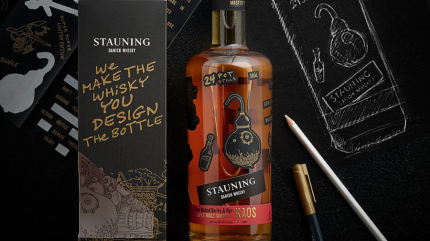
In the mid-2010s, Douglas Murray, a 50-year veteran of running Diageo’s distillation processes in Scotland, found himself in the remote west of Denmark inspecting Stauning, a tiny operation started a decade earlier by nine friends who’d decided – based on a tasting of a transcendent 1977 Ardbeg – that they’d like to make some whisky.
Stauning’s working practices were a world away from the Darwinian model employed at Diageo’s plants. Floor malting. Low yields. Weird mashing practices. Tiny stills, heated by direct fire. In other words, too inefficient and too expensive. Murray’s reported reaction? “These guys are doing what we did 100 years ago.”
As told to me by Stauning co-founder Alex Munch a couple of years ago, it’s a compelling story, and one that illustrates the culture clash between the biggest booze multinational on the planet and what was, at the beginning at least, a hobbyist operation for a bunch of self-confessed nerds.
Hard, then, not to view recent events as sadly inevitable: Diageo’s withdrawal from Distill Ventures and, pending the uncertain future of the company’s involvement with Stauning, 13 job cuts and a halving of the distillery’s output.
And that assessment might even be reinforced by Munch’s recounting of Diageo’s initial approach, back in the day. “It took one-and-a-half years and a lot of discussion,” he told me in 2023. “We were afraid of selling our souls to the Devil.”
But Stauning’s founders needed investment. Back in 2007, banks had laughed them out of their offices, advising them to open a bakery instead. By 2014, however, that tiny distillery in Jutland couldn’t keep up with demand. They needed to expand, and they needed money to do it.
The Devil, in the event, turned out to be more like an angel. Stauning’s founders retained a majority shareholding, even if Diageo whisky veteran David Gates was installed on the board. Most importantly to Munch and his friends, they were allowed to be themselves.
“From the beginning, they didn’t want to change anything,” Munch told me this week, while still coming to terms with Diageo’s withdrawal from Distill Ventures. “We’ve had successes,” – sales volumes were up 50% in 2024 – “but we’ve also been able to do that because of the help from Diageo … It’s been one heck of a ride – really, really fun. We’ve been able to do whatever we’ve wanted to do.”
Diageo’s decision to exit Distill Ventures has consequences far beyond Stauning. It’s understood that some involvement will persist with a couple of the operations covered by the incubator – possibly prior to some form of acquisition – but it’s bad news for most of the roughly 20 brands that were part of the programme before the plug was pulled.
Why, and why now? There are, I think, two separate but connected answers to that question. The first relates to Diageo’s recent travails, the negative response of the markets and the company’s determination to put things right and restore confidence.
After the fiasco of the Latin America-related profits warning in late 2023, the arrival of new CFO Nik Jhangiani a year later was anticipated by commentators as heralding a return to cost discipline, realistic revenue targets and debt reduction. It doesn’t take a huge leap of the imagination to suggest that Jhangiani’s axe found a tempting target in Distill Ventures.
The second, and perhaps even more compelling, reason is the current state of the spirits marketplace around the world. Never mind the constant (but ever-changing) threat of tariffs – as we’ve said before on just-drinks, the post-pandemic economic hangover and geopolitical tensions have left the industry facing its biggest challenges in a generation.
In this context, incubator programmes and each-way bets on artisanal operations become a ‘nice to have’ rather than a ‘must have’. Diageo has sunk £245m-plus into Distill Ventures since it started in 2013, helping more than 35 fledgling businesses along the way.
It has acquired six brands in the process: no-alcohol products Seedlip and Ritual Zero Proof, Mr Black coffee liqueur, Kikori rice whisky, Belsazar vermouth and Tipplesworth RTD cocktails. Strip away the sentiment and, particularly in the context of the current trading environment, ask the brutal question: does that constitute good value for money?
“I think it’s also a reflection of the spirits world as it is right now,” Alex Munch says of Diageo’s withdrawal, highlighting other symptoms of a more general malaise: the production pauses initiated recently by Diageo in Kentucky, and by Pernod Ricard-owned Irish Distillers at Midleton (there are others).
Stauning will survive – Munch is confident of that – and he remains hugely grateful to Diageo for giving the business the resources, expertise and freedom that have enabled it to move way, way beyond its rather humble origins.
In the end, however, the disconnect that was evident during Douglas Murray’s visit over a decade ago has, perhaps, come back to haunt Stauning. Munch references two much larger Danish businesses – Carlsberg and Arla – that, for all their scale, retain smaller, artisanal units to serve the top of the market and the Michelin star restaurants that wouldn’t look twice at their volume brands.
Drinks multinationals, in a bull market especially, need something similar. They need the dynamism, agility and iconoclastic vision that their very scale makes them all but incapable of providing. That’s why Carlsberg and Arla put money into developing beer and cheese that command a price sometimes ten times higher than their core products.
But we’re not in a bull market, and reality has bitten, and bitten hard. Everyone at Stauning knows that harsh fact all too well right now – especially those 13 people who have lost their jobs as a direct result. As Munch says: “All that cool, interesting, nerdy stuff – it stops being quite so interesting at times like this.”



